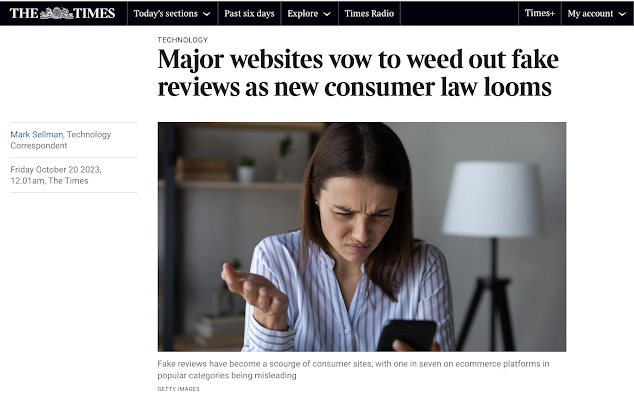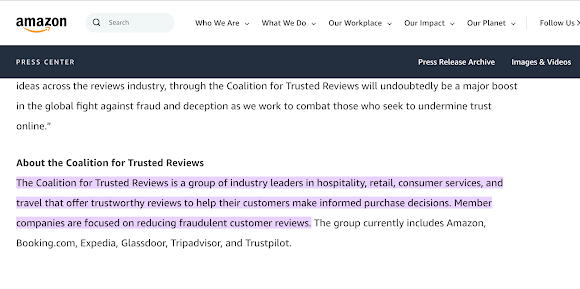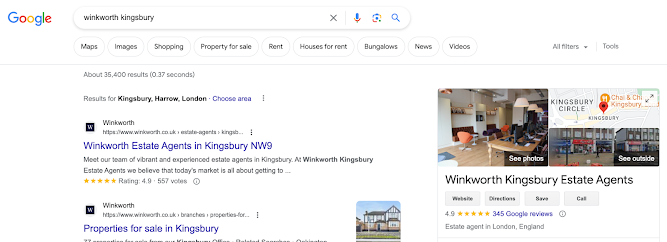Estimates vary, but there appears to be pretty universal acknowledgement that around 15% of all online reviews are fraudulent - 'fake' in short - bought and paid for by unscrupulous businesses. The UK's CMA estimates that consumers were defrauded to the extent of £312 million as a direct result of fake reviews in the last year under review. And that does not begin to address the losses - both financial and emotional - resulting from consumers being misled into using professional service businesses - financial, legal, medical and the like - that are in breach of the CMA regulations.
Here's a link to the full announcement on Amazon's website - Trustpilot's website, as of today's date, remains silent on the issue, so do the others. The 'Coalition for Trusted Reviews' does not, as yet, appear to have a website of its own (please don't hesitate to alert us if you find one). There are also some names absent: Google, the overwhelmingly dominant player in online reviews, Yelp (and, as you might expect, HelpHound).We have read everything there is about this move, as well as other announcements made in the past by these businesses designed to convince their stakeholders that their reviews are trustworthy and that they are doing their very best to ensure that trustworthiness. It is interesting that none of the statements released by the members of the Coalition for Trusted Reviews so far mention potential solutions or courses of action.
Our reaction so far? Hollow words.
The problem
This broadly divides into two distinct issues...
- Sellers of products paying for fake 5* reviews - Amazon alone estimates that there are at least 10,000 Facebook groups dedicated to generating fake reviews on behalf of businesses. Such reviews are for sale across social media. This is obviously not a 'good thing' but getting misled into buying a second-rate product by a business faking reviews is one thing. £Tens, maybe £hundreds, wasted.
- Sellers of services flouting the law - at least in the UK and EU - as well as Google T&Cs that specifically forbid cherry-picking or gating: identifying and then inviting happy customers to write reviews as well as offering rewards for positive reviews. There's nothing wrong with their reviews - they are written by genuine customers - it's the method of invitation and collection that is being abused. Being misled into using a service business by fraudulent manipulation of the review process is of a whole different order of magnitude from point 1 above. Imagine you are looking for a reliable financial adviser, a lawyer, or an oncologist? Even a good estate agent (read on, see the screenshots and then carry out your own Google searches).
The only solution
There is only one solution to this issue. How do we know? Because we went through the very same thought process over ten years ago. We invested heavily in software designed to weed out fraudulent and suspect reviews - we even named the software 'Buster' because it was designed to 'Bust' fake and fraudulent reviews. But it didn't work. By comparison with human oversight and intervention, it was ineffective.
Only a trained human being can spot, with any degree of reliability, a fake or fraudulent review, or, for that matter, a review containing factual inaccuracies or misleading statements that a consumer might then go on to rely on when making purchasing decisions.
Every single review written through HelpHound is moderated by such a human being. We estimate our moderators' accuracy in identifying the contentious areas outlined above is over 97% accurate. Combine that with the fact that the business under review and anyone reading the published review also has the right to challenge its content and the figure climbs further towards the unattainable 100%.
One last question for businesses
If you are paying Trustpilot or any other review site - why? When you can have eminently more visible, credible and influential Google reviews.
You can then use the money saved to host moderated reviews on your own site - reviews that you own - and get a significant proportion of these across to Google.
Look like this...
See those 567 'votes' next to the ***** 4.9 rating? They're the business's own reviews gathered using HelpHound
And this...
When anyone clicks on that 'Write a review' button (top left) their review goes straight to HelpHound moderation - it is that moderation that gives businesses like this the confidence to be proactive in inviting reviews, to their own website and then to Google
And ultimately lead in search like this...
- Moderation - a handbook
- Don't make the mistake of going straight down the Google route - it invariably leads to a game of 'Splat the Rat'
- Results - hard proof that effective review management drives business - both quantity and quality
- CMA regulations - an explanation for businesses










No comments:
Post a Comment
HelpHound is all about feedback, so please feel free to comment here...